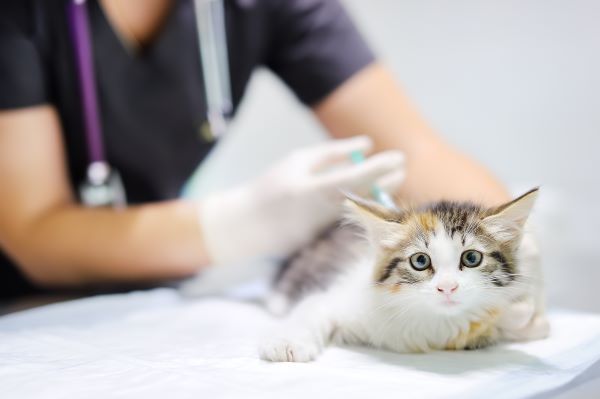Caring for a new kitten: Helping your kitten settle in

Your new kitten may be settling in and scampering about the house as if she owns it, but there a number of important things that you should keep in mind to help a new kitten acclimatise to her new home as easily as possible. While she may be just the cutest bundle of fur you’ve ever seen, sleeping arrangements, toilet training, socialisation, feeding schedules and vet visits are all things you’ll need to tackle early on to avoid frustrations down the track.
 When bringing your kitten home for the first time, it’s important to introduce them to a calm and quiet environment, free of stress. A kitten’s first impression of a new environment is often a lasting one and it’s essential to get things right from the start.
When bringing your kitten home for the first time, it’s important to introduce them to a calm and quiet environment, free of stress. A kitten’s first impression of a new environment is often a lasting one and it’s essential to get things right from the start.
If you haven’t brought your new kitten home yet, but the big day is approaching, be sure to read our article Bringing a new kitten home for the first time: Tips & advice.
Here are our tips for helping your kitten feel at home in her new home.
Sleeping arrangements
If you’ve brought home a very young kitten, chances are she will miss the company of their litter. To help her settle down at night, it’s a good idea to set up her bed in a quiet and controlled environment, such as a spare bedroom. Be sure to fill the bed with soft, comfortable bedding that she can snuggle into.

In colder climates, it’s a good idea to fill a hot water bottle with warm water and bury it under, or amongst the bedding; this should help your kitten to sleep cosily and comfortably.
Sort out the toileting area
When setting up your kitten’s litter box, make sure you choose the location carefully. Once your kitten is used to the idea of going to the toilet in the laundry, for example, they won’t like it if you change litter location to the back door.

When choosing the litter box location, remember that cats need privacy when they go to the toilet. Putting the litter box out in the open and moving it around often may well result in a number of accidents.
See our articles Toilet training your new kitten or cat and Litter tray aversion in cats for more guidance on this topic.
Encourage supervised exploration
Once your new kitten has settled in and is feeling relaxed, an important part of getting her to adapt to her new environment and new home is to allow her to run free and explore.

Cats are territorial creatures that need to develop an understanding of their environment to truly adopt it as their own turf. Young kittens will scratch and sniff and climb all manner of objects to better familiarise themselves with their surroundings. Encourage this behaviour, but keep them under strict supervision at all times.
Socialising from the start
If you’ve got another cat at home or a dog perhaps, it’s important to socialise your kitten early while they’re young. The best time to introduce a kitten to unfamiliar animals is under the age of 14 weeks. This period is also the recommended period for humans to interact with the kitten as much as possible, getting them used to human touch and play.

By the age of 7 or 8 weeks, kittens have developed a good level of hand-eye coordination and are great little playmates. Be sure to supervise them, however, especially around dogs as they can test a pup’s patience pretty quickly at this age.
For more info, see our article Introducing your new kitten to other pets: Tips & advice
Healthy eating for a healthy kitty
If you have experience with cats you’ll probably already know just how fussy they can be when it comes to food. A good tip is to ask your vet for a recommendation and stick with it. There are a number of dry as well as wet cat foods out there that provide you kitten with the required level of nutrition.

Remember, if you’re attempting to change you kitten’s diet, do it gradually. A sudden change can result in diarrhoea and other stomach upsets.
For more info, see our article Different diets for kittens – What to feed your new kitten
Visiting the vet
If you haven’t done it already, make sure you organise to visit a veterinarian. The vet will be able to give you all sorts of information from the health of your cat to their own tips on toilet training and diet.
Make the most out of your first visit to the vet by asking about vaccinations and other health schedules, discuss deworming options and other parasite threats, ask about illnesses that commonly affect kittens and request recommendations around food portions and diet.

Your kitten will require vaccinations against Feline Chlamydia, Feline Immunodeficiency Virus (FIV), Feline Respiratory Disease and Feline Enteritis. These vaccinations will be administered over three visits.
Learn more about cat and kitten vaccinations in our article Cat and kitten vaccination schedule & cat vaccination costs.
In conclusion
 Raising a kitten is one of the most rewarding things you can do and, if you go about it armed with as much knowledge as possible, it can be a relatively easy experience too.
Raising a kitten is one of the most rewarding things you can do and, if you go about it armed with as much knowledge as possible, it can be a relatively easy experience too.
We hope this article has given you some helpful information regarding what you can do to help your new kitten in the early stages while she is settling in to her new home.
Bow Wow Meow Pet Insurance can help protect you and your cat should an unexpected trip to the vet occur.
-
Find out more about our cat insurance options
-
Get an online pet insurance quote










